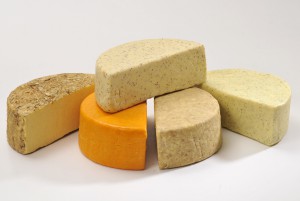14th March 2014 Warsaw, Poland
Say Cheese – Say Caerphilly
Say Cheese – We’ve been all the way to Wales to taste some Caerphilly
Piesek P is on the lookout for GREAT British Cheese in Poland – as he finds it he’ll let you know – just smile.
Often known as “The Crumblies” due to its texture, Caerphilly cheese was mainly produced on small family farms in the Caerphilly, Wales area as a way of using up surplus milk, due to its short maturation period. It is not known whether the cheese was originally produced in the town of Caerphilly itself, or if it acquired the name because of its popularity within the mining community of the town where it was sold at the market.
There are two traditions of Caerphilly. The first stems from small Welsh farm production which dates back from the early 1830s. The cheese was made by hand and was a simple cheese for the farmers. It was the obvious use for surplus milk, vital before refrigeration and for people with little money to spare. Most of the cheese was consumed at home and any surplus was sold locally. It is rumoured that the cheese was developed to provide a quick way to replenish salt lost by Welsh miners after long underground shifts, as well as being popular for its ability to absorb toxic fumes.

The second tradition of Caerphilly involves Cheddar producers in Somerset, which started in the late 19th Century, partly as a result of increased demand from the South. Consumers also wanted a quick maturing cheese to sell young and help their cash flow while the Cheddars were maturing. Caerphilly cheese was often made using Cheddar equipment and the associated larger-scale production methods resulted in a drier cheese. This drier, crumbly, young cheese favoured in later years by large-scale factory production is what is now available in most supermarkets.
During War rationing, Caerphilly production stopped as the cheese was not able to keep well and when production resumed it only took place in a few Welsh creameries. Although Caerphilly production has increased in South Wales finding aged Caerphilly is rare.
Caerphilly is a hard, white cheese. Its texture and flavor bears resemblance to cheddar, which is the most popular type of cheese in the United Kingdom. This cheese is known as “the crumblies”.
The recipe for Caerphilly has been inspired from other crumbly cheeses like Cheshire, young Lancashire and Wensleydale. It is said that the cheese was specially made for coal-miners as its tough texture and shallow height made it easy for them to eat with bare hands while the salty, moist curd helped to replenish lost minerals.
Caerphilly is made from unpasteurized cows’ milk and matured anywhere from 8 to 10 to 14 days. Some variants are often kept for up to a year to develop a harder texture and stronger taste. Inside the pale ivory rind of the cheese, young Caerphilly has a fresh and pleasant taste alongside a moist yet supple texture. With maturity, the edges become creamy and the flavor becomes more rounded. It usually has a wheel-shape with ivory-white rind dusted with fine flour. As the cheese ages in a moist cellar, the white and gray moulds become thicker and more leathery. The cheese can be vegetarian depending upon the brand.
Caerphilly is a GREAT snacking and sandwich cheese. It also is a GREAT ingredient for bigger dishes and loves to be grated and melted. It loves matchmaking with GREAT British pickles and has on occasion been known to be served with pickled onions. A basic white burgundy would go well with this cheese or alternatively match it with a GREAT British real ale.
Say Cheese – Say Caerphilly – A fine cheese from Wales – Taste some for yourself today